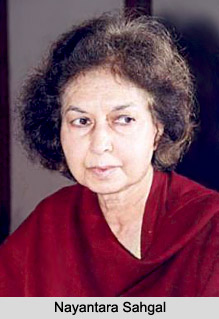 The remarkable novel "Rich like us" is somewhat an eye-opener. Is wealth the only way towards happiness? Perhaps no! The story moves on with the main elite character trapped in the realm of corruption. The expression "Rich like us" is thus enclosed as a question in the novel, which continues throughout the novel. The title thus suits the content and brings out the glaring question that why at all the elites of the society refuses to " trickle down" to the masses.
The remarkable novel "Rich like us" is somewhat an eye-opener. Is wealth the only way towards happiness? Perhaps no! The story moves on with the main elite character trapped in the realm of corruption. The expression "Rich like us" is thus enclosed as a question in the novel, which continues throughout the novel. The title thus suits the content and brings out the glaring question that why at all the elites of the society refuses to " trickle down" to the masses.
Born on May 10, 1927 Nayantara Sahgal was member of one of India`s most prominent political families. With her mother Vijayalakshmi Pandit as India`s first ambassador to the U.N., her uncle Jawaharlal Nehru as India`s first Prime Minister, and her first cousin, Indira Gandhi as India`s third Prime Minister, it is not surprising that politics and history was embedded in her blood. And this background of hers inspire and underlie much of her writing. In later days after publication of some of her books Nayantara Sahgal became popular as a writer with feminist concerns seeking independent existence of women. She sees women as victims of conventional Indian society engaged in their quest for identity. In one of her novels her concept of emancipation reaches its pinnacle where her female character revolts and fights back. From 1972 to 1975 Nayantara Sahgal served as an advisor to Sahitya Akademi`s Board for English. She was a member of Verghese Committee for Autonomy to Radio & TV in 1977-78. In 1978, she was member of the Indian delegation to U.N. General Assembly. She has also held the post of Vice-President of People`s Union for Civil Liberties. Among many of her achievements the Sinclair Prize (Britain) for fiction in 1985, Sahitya Akademi Award in 1986, and Commonwealth Writers Award (Eurasia) in 1987 are most prominenet. She was also a Fellow of the Woodrow Wilson International Centre for Scholars, Washington from 1981 to 1982.
Synopsis:
The wonderful piece of literature `Rich like us` by Nayantara Sahgal is not only tells the personal stories of two women but also captures the time when Prime Minister Indira Gandhi in India declared Emergency in 1975. This story of Sahgal received wide critical acclaim. The story also narrates the critical moments in Indian history, the freedom struggle, the partition, the Indian independence and its aftermath, the impact of the Emergency is viewed through the eyes of Sonali, a civil servant, and Rose, an Englishwoman who has lived in India for more than forty years. The story covers a wide ground and gives every instances of being the author a good storyteller. In the dark days in Indian history when democracy collapsed for a while Sahgal does a wonderful job of capturing that darkness and the desperation that people felt. His story is laced with irony and humor too, which make the book more attractive.
The emergency was Indira Gandhi`s brainchild and in Sahgal`s story it is projected as a "a thinly disguised masquerade, preparing the country for family rule". `Rich like us` engages the complications of the emergency across diverse socio-economic, racial and intellectual backgrounds. The author rightly interlinks the concerns she experiences in her daily life with the physical and psychological conditions of her main characters in the changing socio-political condition of modern India. The novel highlights the tales of suffering and oppression endured by the masses. It also exposes the failure of the Nation. At times Sahgal is concerned with the ways in which the emergency challenges the identities of her central figures.
`Rich like us` by Nayantara Sahgal is published by the W W Norton and co Inc. in the year of 1986.
`Rich like us` is a critically acclaimed creation by Nayantara Sahgal. The backdrop of the story is set in Delhi during the time between 1932 and mid-70. The story mainly revolves around two main female characters, Rose and Sonali. The story centralizes on the matter of their fight to live in a time of political agitation and social re-organisation.



















